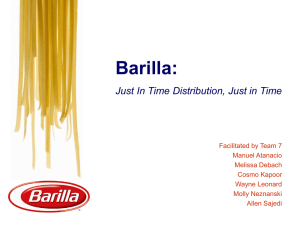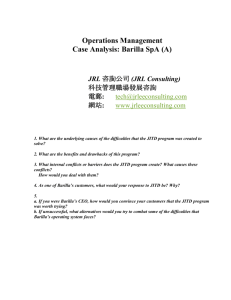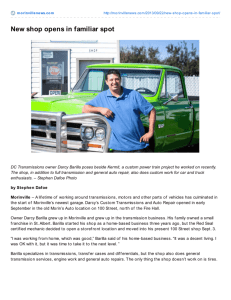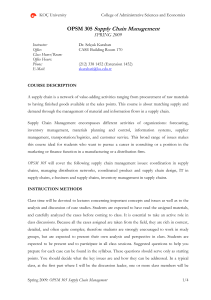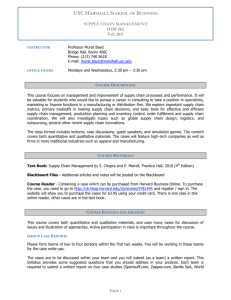Barilla SpA Case Study - Global Transaction Banking
advertisement
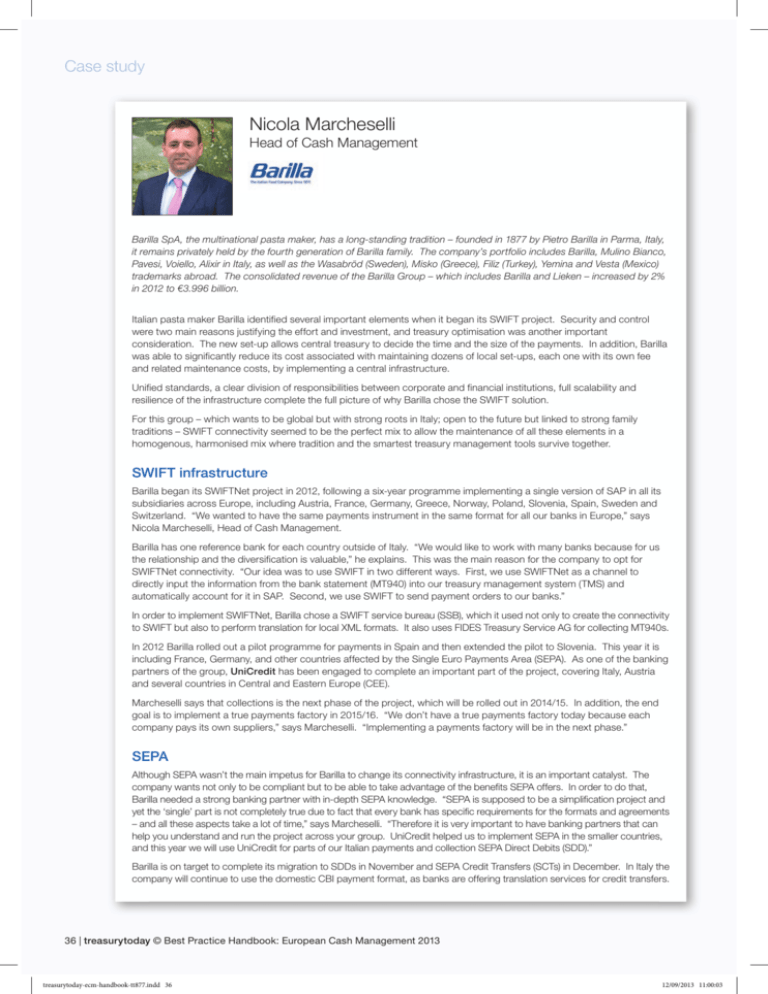
Case study Nicola Marcheselli Head of Cash Management Barilla SpA, the multinational pasta maker, has a long-standing tradition – founded in 1877 by Pietro Barilla in Parma, Italy, it remains privately held by the fourth generation of Barilla family. The company’s portfolio includes Barilla, Mulino Bianco, Pavesi, Voiello, Alixir in Italy, as well as the Wasabröd (Sweden), Misko (Greece), Filiz (Turkey), Yemina and Vesta (Mexico) trademarks abroad. The consolidated revenue of the Barilla Group – which includes Barilla and Lieken – increased by 2% in 2012 to €3.996 billion. Italian pasta maker Barilla identified several important elements when it began its SWIFT project. Security and control were two main reasons justifying the effort and investment, and treasury optimisation was another important consideration. The new set-up allows central treasury to decide the time and the size of the payments. In addition, Barilla was able to significantly reduce its cost associated with maintaining dozens of local set-ups, each one with its own fee and related maintenance costs, by implementing a central infrastructure. Unified standards, a clear division of responsibilities between corporate and financial institutions, full scalability and resilience of the infrastructure complete the full picture of why Barilla chose the SWIFT solution. For this group – which wants to be global but with strong roots in Italy; open to the future but linked to strong family traditions – SWIFT connectivity seemed to be the perfect mix to allow the maintenance of all these elements in a homogenous, harmonised mix where tradition and the smartest treasury management tools survive together. SWIFT infrastructure Barilla began its SWIFTNet project in 2012, following a six-year programme implementing a single version of SAP in all its subsidiaries across Europe, including Austria, France, Germany, Greece, Norway, Poland, Slovenia, Spain, Sweden and Switzerland. “We wanted to have the same payments instrument in the same format for all our banks in Europe,” says Nicola Marcheselli, Head of Cash Management. Barilla has one reference bank for each country outside of Italy. “We would like to work with many banks because for us the relationship and the diversification is valuable,” he explains. This was the main reason for the company to opt for SWIFTNet connectivity. “Our idea was to use SWIFT in two different ways. First, we use SWIFTNet as a channel to directly input the information from the bank statement (MT940) into our treasury management system (TMS) and automatically account for it in SAP. Second, we use SWIFT to send payment orders to our banks.” In order to implement SWIFTNet, Barilla chose a SWIFT service bureau (SSB), which it used not only to create the connectivity to SWIFT but also to perform translation for local XML formats. It also uses FIDES Treasury Service AG for collecting MT940s. In 2012 Barilla rolled out a pilot programme for payments in Spain and then extended the pilot to Slovenia. This year it is including France, Germany, and other countries affected by the Single Euro Payments Area (SEPA). As one of the banking partners of the group, UniCredit has been engaged to complete an important part of the project, covering Italy, Austria and several countries in Central and Eastern Europe (CEE). Marcheselli says that collections is the next phase of the project, which will be rolled out in 2014/15. In addition, the end goal is to implement a true payments factory in 2015/16. “We don’t have a true payments factory today because each company pays its own suppliers,” says Marcheselli. “Implementing a payments factory will be in the next phase.” SEPA Although SEPA wasn’t the main impetus for Barilla to change its connectivity infrastructure, it is an important catalyst. The company wants not only to be compliant but to be able to take advantage of the benefits SEPA offers. In order to do that, Barilla needed a strong banking partner with in-depth SEPA knowledge. “SEPA is supposed to be a simplification project and yet the ‘single’ part is not completely true due to fact that every bank has specific requirements for the formats and agreements – and all these aspects take a lot of time,” says Marcheselli. “Therefore it is very important to have banking partners that can help you understand and run the project across your group. UniCredit helped us to implement SEPA in the smaller countries, and this year we will use UniCredit for parts of our Italian payments and collection SEPA Direct Debits (SDD).” Barilla is on target to complete its migration to SDDs in November and SEPA Credit Transfers (SCTs) in December. In Italy the company will continue to use the domestic CBI payment format, as banks are offering translation services for credit transfers. 36 | treasurytoday © Best Practice Handbook: European Cash Management 2013 treasurytoday-ecm-handbook-tt877.indd 36 12/09/2013 11:00:03


